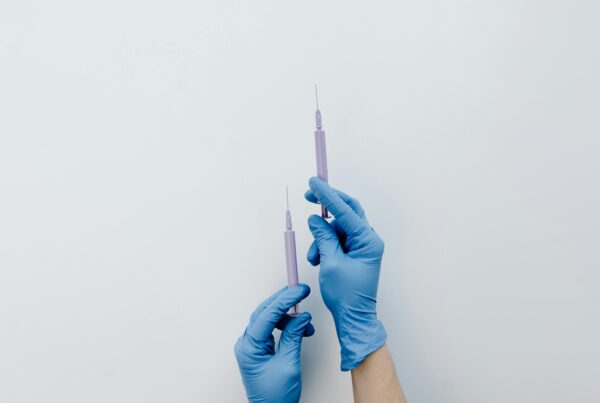Most of us, at some point, have struggled with sleep. Either we struggle to fall asleep or struggle to wake up in the mornings. Sometimes, both are true. It’s no secret that 2020 was (and so far 2021) has been tough. For many people, this has played havoc with their sleep cycle. The sleep foundation recommends between 7 and 9 hours of sleep per night for adults. Most of us don’t get enough sleep and this is likely due to our obsession with screens. So, what can we do to improve this? Could melatonin supplements be the answer to our sleep-deprivation woes? Or are they more dangerous than we think?
What is melatonin and how does it work?

fizkes/shutterstock
Melatonin is a hormone that the body naturally produces. It is most notable for its role in the sleep cycle. It’s produced by the pineal gland which is pea-sized and can be found just above the middle of the brain. The body typically increases the production of melatonin at night. Once the sun sets, the levels of melatonin in the body increase.
In the morning, levels of melatonin drop significantly to signal to the body that it is time to wake up. It’s also influenced by how much light you get during the day and your sleep cycle.
In some cases, trouble sleeping is linked to low melatonin levels. In simple terms, it’s directly affected by light. Light inhibits melatonin production whilst darkness stimulates it.
Melatonin Supplements
It also comes in the form of supplements. This form of melatonin is usually found in pill or liquid form. Most of the time, it is synthetically made in a lab, but some options are natural. Natural melatonin supplements come from the pineal glands of animals. Taking it in liquid form or in a pill that can be sucked is a more efficient way to get melatonin into the body. This is because absorption is quicker. It’s best to take the synthetic form of melatonin because the natural form can contain viruses.
Another sleep problem that can be aided by melatonin supplements includes something called delayed sleep phase disorder. Delayed sleep phase disorder is typified by an inability to fall asleep before 2 am. As well as difficulty waking up in the morning. Another reason people might take it as a supplement is if they do shift work which disrupts normal sleep patterns.
Why take a melatonin supplement?
It is often taken after an overseas trip and is used to readjust the body clock. Most commonly, however, it is taken as a natural remedy for insomnia and other sleep disorders.
![worry sleep [longevity live]](https://longevitylive.com/wp-content/uploads/2019/04/adult-asleep-bed-935777-320x213.jpg)
The supplements are not regulated by the Food and Drug Administration (FDA). This unfortunately means that there is only limited information when it comes to how much melatonin is safe to take. When it comes to studies of melatonin supplements, the doses vary hugely from 0.1 to 10 mg.
A 2017 study claims that the typical dose is between 1 and 5 mg. Typically, it takes between 1 and 2 hours to work and is thus, taken about 2 hours before bed. Melatonin supplements are classified as a dietary supplement rather than as a drug. This means that they are much less strictly regulated. Because of this, “label claims and product safety” don’t have to meet FDA approval. In fact, a 2017 study found that out of the 31 melatonin supplements 71% of the products didn’t match the claim on the label. More worrying than that, 26% of the products contained serotonin which can be harmful even in tiny doses.
When you’re looking for a melatonin product, the best option is to look for products that are “USP verified”. USP stands for United States Pharmacopeia. An independent organization which “works to ensure proper quality and dosing of dietary supplements”. Doctors are also currently studying melatonin for its potential benefits in the treatment of Alzheimer’s disease, cancer, ALS, high blood pressure at night, and sleep problems in children with autism.
Too much of a good thing?

Photo by Cleyder Duque from Pexels
Could taking melatonin supplements in the long term cause problems though? Although it’s generally thought to have fewer side effects than other sleep-aiding medications, there is still a risk involved.
For instance, they are potentially dangerous when combined with medications such as anticoagulants (blood thinners), immunosuppressants, diabetes treatments, and birth control pills.
Pregnant and breastfeeding women should also avoid melatonin supplements. Make sure you speak to your doctor before using a melatonin supplement if you have an immune condition, epilepsy, kidney disease, or liver disease.
As for the symptoms of taking too much melatonin, according to both WebMD and Healthline, they’re usually pretty mild and include:
- Headache
- Sleepiness
- Dizziness
- Stomach cramps
Some less common side effects of taking too much melatonin, according to Healthline, are:
- Irritability
- Tremors
- Confusion
- Disorientation
- Low blood pressure
- Depressive episodes (short-lived)
- Anxiety
Taking too much of anything is never recommended and not everybody will react the same. It’s important to be aware of how much you are taking. It’s also always a good idea to chat with your doctor before adding any supplements. This is especially important if you plan to be taking them regularly.
If you do take melatonin and still can’t seem to fall asleep, an additional dose, though unlikely to cause harm, increases your risk of experiencing side effects.
References
https://www.webmd.com/vitamins/ai/ingredientmono-940/melatonin
https://www.healthline.com/health/is-it-bad-to-take-melatonin-every-night
https://www.webmd.com/sleep-disorders/what-is-melatonin
https://www.sleepfoundation.org/how-sleep-works/how-much-sleep-do-we-really-need





![women [longevity live]](https://longevitylive.com/wp-content/uploads/2020/01/photo-of-women-walking-down-the-street-1116984-100x100.jpg)










